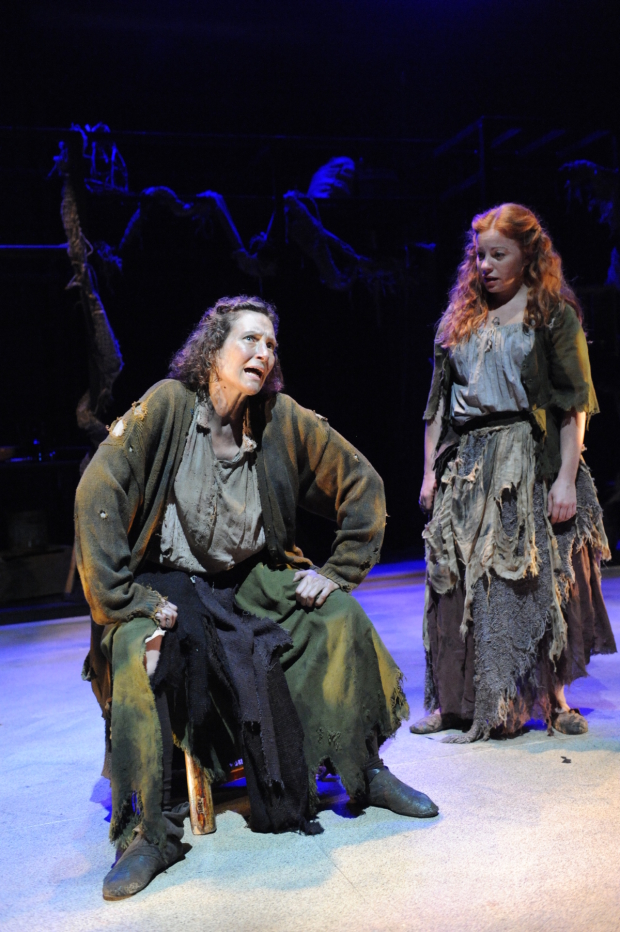Judith and Vinegar Tom

(© Stan Barouh)
When it's warm outside, sitting down to the densely worded, brain-bludgeoning language and plot of a Howard Barker play may seem like a ponderous undertaking. And it is. But thankfully, Potomac Theatre Project has chosen well with Barker's 1992 take on a biblical story, Judith: A Parting From the Body (it runs just under an hour), and paired it with Caryl Churchill's somewhat longer, feminist examination of 17th-century witch hunts in England, Vinegar Tom (1976), both running together at Atlantic Stage 2.
The two plays complement each other primarily in their attention to strong female characters who, by turns, manipulate men and are manipulated, persecuted, and tortured by them. As companion pieces, Judith and Vinegar Tom edgily translate old stories about the nasty power struggles between the sexes into contemporary contexts. As pieces of theater, they're the mental equivalent of a sweaty workout at the gym.

(© Stan Barouh)
Barker's play is a modern retelling of the biblical story of Judith, a beautiful Jewish widow who uses her charms to win the favor of the general Holofernes, who plans to slaughter the Israelites. With the help of her servant, Judith cuts off his head and saves her people from annihilation.
Pamela J. Gray, who played the strong female title role in Barker's Gertrude last year for PTP, brings an alluring, deceptive innocence to Judith as she falls strangely in love with the death-obsessed Holofernes, the man whom she must murder, played with beguiling tenderness by Alex Draper. With a cast clad in black (costumes by Mira Veikley) and a script dense with poetic language and abstruse musings on love and mortality, Judith might have been hard going if not for the comical interjections of Judith's servant, the wonderfully sassy Patricia Buckley.
Barker takes liberties with the biblical story, giving Judith an unexpectedly treacherous transformation following the beheading that Gray infuses with frightening venom, but the provocative twist hints at the justifications that we manufacture to unleash our darkest desires. There's not much that director Richard Romagnoli can do to help us slash through the jungle of twisting sentences and inexplicable shifts in Judith's and Holofernes' personalities, but then again Barker likely wouldn't want him to.
In a different though related vein, Vinegar Tom, Churchill's feminist, quasi-Brechtian play with music, looks at the religious, misogynistic hysteria involving accusations of witchcraft in a 17th-century English town. When the butter won't churn, the cows get the shakes, and a man's member mysteriously goes missing, there's only one explanation: There be witches afoot. The wildly talented Tara Giordano plays Alice, a young woman accused of the black arts along with her mother, the querulous beggar Joan, played with real vinegar by Nesba Crenshaw.
Vinegar Tom is a quirky hybrid of genres that evokes elements of The Crucible with a bit of Little Shop of Horrors thrown in. A merry trio of singers (Caitlin Rose Duffy, Joelle Mendoza, and Liana Barron in modern dress) periodically enters and warbles tunes laced with vulgarity that comment, often obliquely, on the action taking place back in merry old England. The "witches" and their persecutors, they imply, are really us. But without the songs, we kind of knew that already.
This devise of using modern music to comment on past events must have seemed provocative back in 1976, but now it feels overwrought. Despite Churchill's uncannily authentic-sounding dialogue (Lucy Faust stands out for her convincing delivery and subtle performance as Ellen, the "cunning woman"), director Cheryl Faraone can't keep the piece from feeling contrived, even though the musical interludes are blithely ironic. There's no getting around the feeling that we would have gotten the message without the music. Judith, on the other hand, leaves us not quite sure what the message is in the first place. At two hours and 40 minutes, a heavy-themed double bill like this sometimes make us wish for a bit more levity, like a singing Audrey II.










